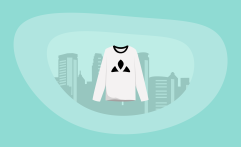15 Most Sustainable Sneaker Brands: The Conscious Consumer’s Guide
Affiliate Disclosure
Hey fellow impactful ninja ?
You may have noticed that Impactful Ninja is all about providing helpful information to make a positive impact on the world and society. And that we love to link back to where we found all the information for each of our posts.
Most of these links are informational-based for you to check out their primary sources with one click.
But some of these links are so-called "affiliate links" to products that we recommend.
Why do we add these product links?
First and foremost, because we believe that they add value to you. For example, when we wrote a post about the environmental impact of long showers, we came across an EPA recommendation to use WaterSense showerheads. So we linked to where you can find them. Or, for many of our posts, we also link to our favorite books on that topic so that you can get a much more holistic overview than one single blog post could provide.
And when there is an affiliate program for these products, we sign up for it. For example, as Amazon Associates, we earn from qualifying purchases.
What do these affiliate links mean for you?
First, and most importantly, we still only recommend products that we believe add value for you.
When you buy something through one of our affiliate links, we may earn a small commission - but at no additional costs to you.
And when you buy something through a link that is not an affiliate link, we won’t receive any commission but we’ll still be happy to have helped you.
What do these affiliate links mean for us?
When we find products that we believe add value to you and the seller has an affiliate program, we sign up for it.
When you buy something through one of our affiliate links, we may earn a small commission (at no extra costs to you).
And at this point in time, all money is reinvested in sharing the most helpful content with you. This includes all operating costs for running this site and the content creation itself.
What does this mean for me personally?
You may have noticed by the way Impactful Ninja is operated that money is not the driving factor behind it. It is a passion project of mine and I love to share helpful information with you to make a positive impact on the world and society. However, it's a project in that I invest a lot of time and also quite some money.
Eventually, my dream is to one day turn this passion project into my full-time job and provide even more helpful information. But that's still a long time to go.
Stay impactful,
Amid growing concerns about the textile industry’s environmental impact, there is pressure to find greener clothes for your wardrobe, from everyday dresses to activewear sneakers. Unfortunately, fashion greenwashing makes it harder for you and all other consumers to figure out which clothing brands offer the most eco-friendly garments. So, we had to ask: Which are the most sustainable sneaker brands?
The most sustainable sock brands are Nothing New, CARIUMA, and VEJA, which prioritize low-impact renewable materials, reduce waste, and strive for circularity. In addition, Allbirds and PSUDO reduce carbon emissions and adhere to ethical manufacturing.
Whether you are searching for the perfect pair of sneakers for everyday comfort or outdoor activities to add to your wardrobe without negatively impacting the soil, the water, the animals, and other people, there is a brand for you. So, let’s keep reading to learn more about the most sustainable sock brands and how they ensure sustainable, ethical practices.
Here’s How We Selected the 15 Most Sustainable Sneaker Brands
The fast fashion industry has pushed for sneakers to be trendy and easily replaced. Yet, the environmental impacts of making and landfilling sneakers can be enormous, especially with certain materials.
“Sustainable: The ability to be maintained at a certain rate or level | Avoidance of the depletion of natural resources in order to maintain an ecological balance”
Oxford Dictionary
The brands on this list were chosen based on their commitment and actions to promote sustainable practices while reducing the environmental impacts of the textile industry.
They are transparent about their materials, processes, and workforce management within their supply chain.
Some brands focus their efforts on reducing waste and optimizing natural resources while others strive to reduce the carbon footprint of their clothes.
All of these brands share the commitment to reshape the textile industry toward a more sustainable and Earth-friendly sector.
These Are the 15 Most Sustainable Sneaker Brands
Most Sustainable Sneaker Brands
Overall, these sneaker brands are sustainable. Yet, they take various approaches to reduce environmental impacts and uphold ethical standards. Let’s dive into each brand and find out more.
Nothing New: Sneakers of Luxury Quality Built With Sustainable Materials

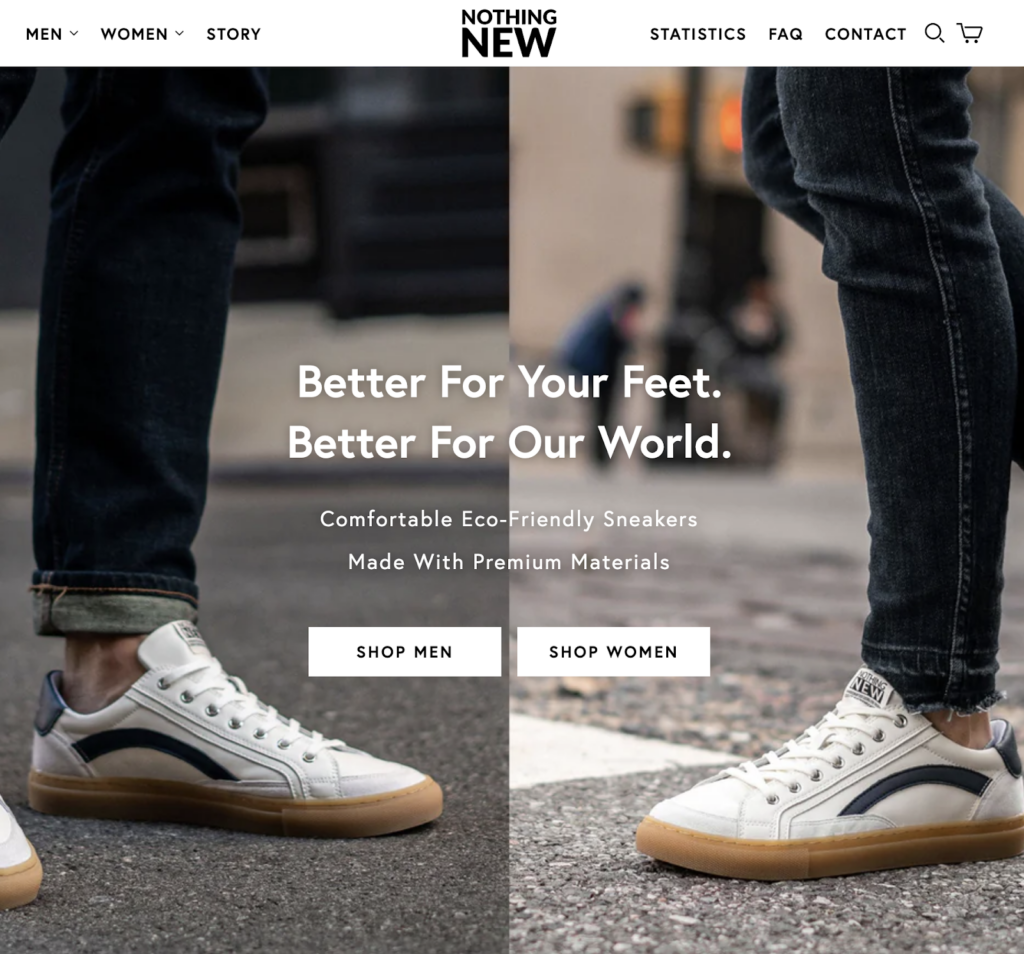
“By helping develop best-in-class sustainable products and investing in programs to minimize our environmental footprint, we hope to raise the bar for what customers expect from brands and contribute to the change we.”
Nothing New
🌎
How do they ensure their sustainability?
Nothing New ensures sustainability by lowering their carbon footprint. They achieve this firstly by prioritizing recycled materials to make their sneakers and packaging. Their Beyond CanvasTM is canvas material based entirely on post-consumer recycled plastic with Global Recycle Standard (GRS) certification, reverting on average 5.6 plastic water bottles away from landfills per pair of sneakers. Nothing New also rescues leather to make Beyond LeatherTM, another upper sneaker material certified by GRS. The suede leather used in some of their shoes is manufactured chrome-free by a tannery with a gold standard from the Leather Working Group. Further down the life-cycle in the manufacturing stage, Nothing New reduces their environmental impacts by avoiding cement and vulcanized construction of the shoes, which involves chemical-based glues and sulfur emissions. Instead, they opt for stitch construction, creating a more flexible and durable bond between the outsole and upper, extending the shoes’ lifespan. Beyond making long-lasting products, Nothing New also runs the Virtuous Circle Program, encouraging consumers to send in pre-loved shoes to be donated or disassembled for material recycling. Lastly, Nothing New offsets all their emissions in projects expanding forests that capture and store carbon, generating wind energy, and replacing fossil fuels with biofuels.
🌐
How do they ensure their ethics?
Nothing New partly traces their supply chain, including the final stage of production, as well as some of the second stage.
🤝
Are they part of any giving-back programs?
Nothing New donates used shoes.
🛍️
What is their product range?
- Best for: menswear, womenswear
- Product range: low-top sneakers, high-top sneakers, socks, accessories
- Price range: $$
- Size range: XS–XXL
CARIUMA: Sneakers Designed for Style, Comfort, and Sustainability
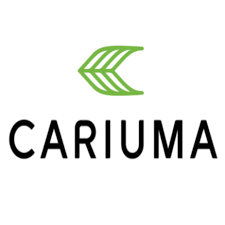
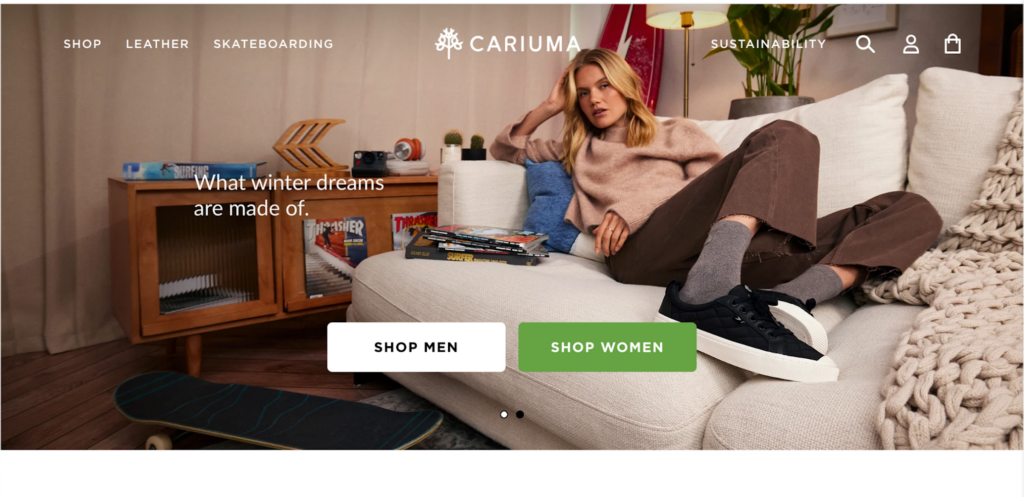
“We iterate a sneaker style for a year + before we bring it to production and we attempt to reduce the number of steps it takes to manufacture (which saves energy and time).”
CARIUMA
🌎
How do they ensure their sustainability?
CARIUMA prioritizes sustainability by increasing the natural content of their products. In particular, they prioritize materials that renew quickly, like bamboo and sugarcane, and plant-derived substances, such as cork and rubber, that can be harvested without cutting down trees. CARIUMA also sources lower-impact alternatives to conventional sneaker materials, for example, organic cotton instead of cotton, mamona oil instead of petroleum, recycled nylon instead of virgin nylon, and rPET (recycled PET—polyethylene terephthalate—plastic) instead of virgin plastics. The leather used in CARIUMA sneakers is sourced, tanned, and finished with low-waste methods, renewable and recycled inputs, and fewer chemicals. Their responsible practices involve recycled water, renewable energy, and a closed-loop tanning chemical system to protect the surrounding land and groundwater. CARIUMA exclusively sources leather as a byproduct of best-practice food industry cattle, which are steroid-free and grass-fed on naturally treeless plains indigenous to South America. Furthermore, they reduce their carbon footprint via a series of initiatives, including using solar energy, LED lighting, and a cooling tower in their warehouse, delivering sneakers in one recycled and recyclable paper box (which acts as both packaging and a shoe box), and opting for a carbon-neutral shipping option.
🌐
How do they ensure their ethics?
CARIUMA binds their suppliers to a Code of Conduct that covers all of the ILO’s Fundamental Freedoms Principles. They also trace most of their supply, specifically, 100% of Tier 1 suppliers—the footwear manufacturer, 85% of Tier 2 suppliers involving raw material processors, mills, knitting, packaging, outsole factory, and components in general, and 59% of their Tier 3 suppliers who provide yarns, polymers, and chips. Additionally, their manufacturing partner is audited annually by WRAP. They also visit their suppliers routinely. Regarding the use of animal skins in their leather sneakers, CARIUMA has an Animal Welfare Policy, ensuring animal welfare standards and transparency in the leather supply chain. Their leather suppliers are certified and audited by the Leather Working Group (LWG)
🤝
Are they part of any giving-back programs?
Since June 2020, CARIUMA has committed to planting two trees for every pair of sneakers they sell. Their reforestation program started in Brazil, with over 2 million trees planted. They work closely with the local indigenous communities, following their guidance on how to tend to the land and best support regrowth and restoration, improve seed storage efficiency, and go about replanting methods that mitigate risk and preserve biodiversity.
🛍️
What is their product range?
- Best for: womenswear, menswear
- Product range: sneakers
- Price range: $$
- Size range: XS–XL
VEJA: Sneakers Made With Innovative, Low-Impact Materials
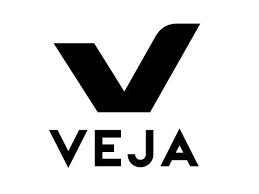
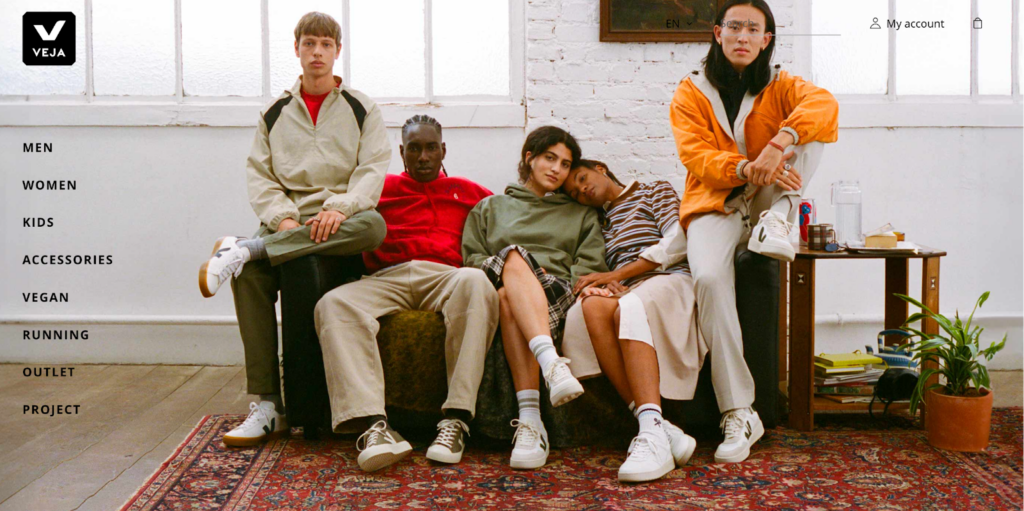
“VEJA is walking on two feet: ecology and social justice on one side, design on the other. We never compromise between the both of them.”
Sebastien Kopp, Co-Founder of VEJA
🌎
How do they ensure their sustainability?
VEJA ensures sustainability by opting for a high proportion of low-impact materials and reducing textile waste. In 2020, recycled polyester and organic cotton made up nearly 76% of their sneaker materials. They also use other eco-friendly materials, including organic jute and recycled cotton. With leather, the traditional shoe material, VEJA strives to improve traceability and transparency. All their tanning partners are Gold certified by the Leather Working Group which promotes sustainable environmental practices in the leather industry. VEJA discloses the total carbon emissions released throughout their supply chain and the equivalent carbon footprint of various models. By working out the proportion of their emissions, they identify the hot spots and reduce their footprints in multiple ways, including using renewable energy, improving the most-polluting products (leather-based sneakers), reducing air freight for transportation from factories to retailers, and taking the train as the main transporting methods for team members. In June 2020, they launched their VEJA x Darwin project, a test hub for cleaning, repairing, and recycling old sneakers, keeping materials longer in circulation while reducing waste and carbon footprint.
🌐
How do they ensure their ethics?
Fair trade is one of the three fundamental pillars VEJA is built on. They work directly with producers and use annual contracts to guarantee income and a reasonable price for producers. Workers who manufacture VEJA sneakers are well compensated and live in normal conditions. Their Supplier Code of Conduct covers the ILO’s Four Fundamental Freedoms principles. VEJA also traces most of their supply chain and visits their suppliers regularly.
🤝
Are they part of any giving-back programs?
VEJA partners with Log’ins (Logistics & Insertion), an organization that employs people with light disabilities and promotes their social inclusion. In 2022, more than 200 employees recognized as disabled workers were supported by Log’ins.
🛍️
What is their product range?
- Best for: womenswear, menswear, childrenswear
- Product range: sneakers
- Price range: $$
- Size range: XS–XXL
Allbirds: Simple and Comfortable Footwear Made With Nature-Based Materials

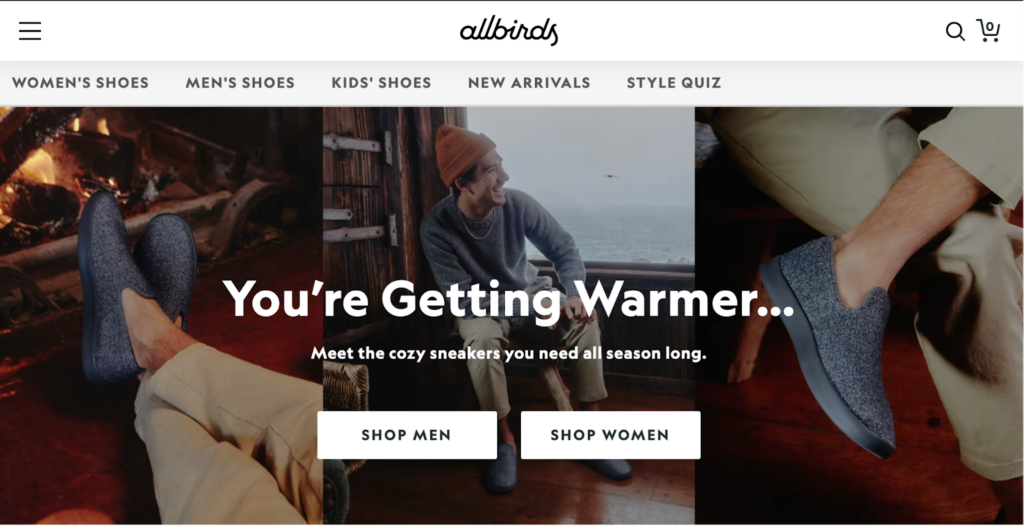
“Reducing the carbon footprint of our products is at the heart of everything we do.”
Allbirds
🌎
How do they ensure their sustainability?
Allbirds ensures sustainability by committing to a concrete plan to achieve net zero carbon by 2030 through meticulously measuring their carbon footprint and working to reduce the emissions beyond carbon neutrality while offsetting the current emissions to operate as a carbon-neutral business. They rely on renewable materials, regenerative agriculture, and responsible energy to reduce their carbon footprint. Specifically, Allbirds sources natural and recycled fabrics to replace petroleum-based synthetic textile materials. The brand even invented their own nature-based alternative called SweetFoam®, their shoe sole material derived from the world’s first carbon-negative green EVA (ethylene-vinyl acetate). They’ve also invested in novel solutions, like Plant Leather, a 100% natural, plant-based leather. Additionally, more than 60% of their merino wool currently comes from regenerative agriculture, which has the potential to reverse climate change while promoting biodiversity. Further down the life-cycle, Allbirds actively reduces their carbon footprint in manufacturing and transporting by using renewable energy in their “owned & operated” facilities and their finished goods manufacturers, shipping by boats, and reducing 40% packaging material by using one post-consumer recycled cardboard as a 2-in-1 shoe box/shipping box. In spring 2024, Allbirds plans to launch M0.0NSHOT—a net zero carbon shoe (a standard sneaker has an average footprint of about 14 kg CO2 eq). Lastly, they encourage buying and selling slightly imperfect and gently used Allbirds products on Allbirds ReRun™ to extend the products’ life-cycle.
🌐
How do they ensure their ethics?
Allbirds has a Supplier Code of Conduct, drawing upon ILO Core Labor Standards to ensure safe working conditions, respect and dignity for workers, and environmentally responsible manufacturing processes in Allbirds’ supply chain. They require independent, third-party social and environmental audits of their Tier 1 suppliers. They also strive for transparency and traceability in their supply chain: 100% of their Tier 1 and Tier 2 suppliers are currently mapped with a target to reach 100% supply chain traceability by 2025. Additionally, their Animal Welfare Policy ensures their merino wool is held to high farming standards, land management, and animal welfare. Their merino wool is also certified by ZQ Merino, covering sustainability and ethics from farm to fashion.
🤝
Are they part of any giving-back programs?
Allbirds donates slightly used shoes returned by customers to Soles4Souls, an organization that helps to empower people living in poverty by creating jobs for them. During the COVID-19 pandemic, Allbirds supported healthcare workers by donating shoes and running a “buy one, give one” option, enabling customers to get involved and show appreciation for those making a difference.
🛍️
What is their product range?
- Best for: womenswear, menswear, kidswear
- Product range: sneakers, socks
- Price range: $$
- Size range: XS–XXL
PSUDO: Ethical Sneakers Designing Out Waste

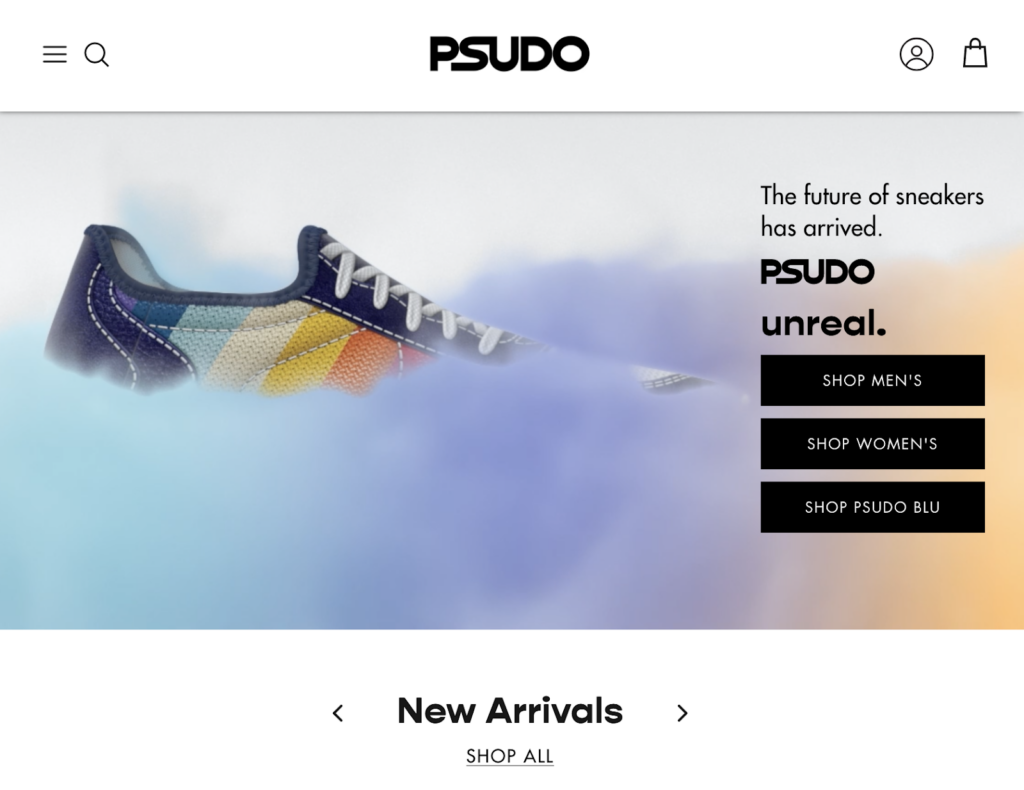
“We source American and sustainable materials, we employ locals, and we do our very best to build a community around being grateful and giving back.”
PSUDO
🌎
How do they ensure their sustainability?
PSUDO ensures sustainability by using recycled materials, designing out waste, and keeping their supply chain short and local. Firstly, they source plastic waste for their 3-piece sneakers, saving 7.2 plastic bottles (and tons of other waste) from landfills and oceans with every pair purchased. Specifically, the “lace-free, waste-free” uppers of PSUDO sneakers are made with REPREVE fibers, a recycled polyester fabric made with plastic bottles. Additionally, the insoles and soles of the PSUDO blu collection are constructed with 85% recycled foam made in a solar-powered facility. Secondly, PSUDO reduces waste by using a minimalist slip-on design. Their sneakers are built with only three pieces: lace-free upper, insole, and outsole, reducing waste associated with parts like laces or eyelets. They further eliminate waste by producing in small batches. Lastly, they keep their entire supply chain (fabrics, foams, and sneaker assembling) short and local, with four manufacturing partners based in the US and one in neighboring El Salvador, cutting down the transporting carbon footprint of their products.
🌐
How do they ensure their ethics?
PSUDO ensures ethics by keeping a short and transparent supply chain and committing to ethical labor practices.
🤝
Are they part of any giving-back programs?
PSUDO donates part of their sneaker sales to various organizations, such as Soles4Souls, Point Foundation, and GLAAD.
🛍️
What is their product range?
- Best for: menswear, womenswear
- Product range: sneakers
- Price range: $$$
- Size range: S–XL
Wildling Shoes: Sustainable Shoe Brand Supporting Regenerative Agriculture


“As a certified B Corp, we are part of the community of companies that have made it their mission to meet the strictest standards in terms of social and environmental business practices and transparency in order to take responsibility for a livable future.”
Wildling Shoes
🌎
How do they ensure their sustainability?
Wildling Shoes ensures sustainability by striving to be regenerative at all levels. Firstly, they source innovative materials from regenerative cultivation to make their sneakers. Specifically, they use sheep wool by Nordwolle, a product of regenerative entrepreneurship. This wool material comes from the endangered Pomeranian Coarsewool sheep, which are raised in an attempt to preserve biodiversity in the district of Vorpommern-Rügen, Germany. Wildling Shoes also uses eco-friendly hemp fiber in their shoes, which they source from the French regenerative cooperative Virgocoop. They avoid conventional cotton from nonregenerative operations and utilize recycled cotton instead. Secondly, Wilding Shoes supports renaturation projects, such as the work of Rewilding Portugal. Furthermore, they keep their sourcing and manufacturing within relatively short distances to reduce their transport carbon footprint. For example, all the steps in producing their Perto sneakers, from sheep rearing and shearing to washing, spinning, and weaving the wool to manufacturing the finished shoes, take place within a small radius of just 150 kilometers (approximately 93 miles).
🌐
How do they ensure their ethics?
Wildling Shoes ensures their ethics by building strong partnerships and ensuring transparency in their supply chain. They disclose the source of their various shoe materials, such as coarse sheep wool, dog wool, and hemp. The final stage of Wildling Shoes’ production is undertaken in Portugal, a medium-risk country for labor abuse.
🤝
Are they part of any giving-back programs?
Wildling Shoes is not known to be part of any giving-back programs.
🛍️
What is their product range?
- Best for: kidswear, menswear, womenswear
- Product range: sneakers, accessories, socks, T-shirts
- Price range: $$
- Size range: XS–XXL
MoEa: Bio-Sneakers Made From Fruits and Plants

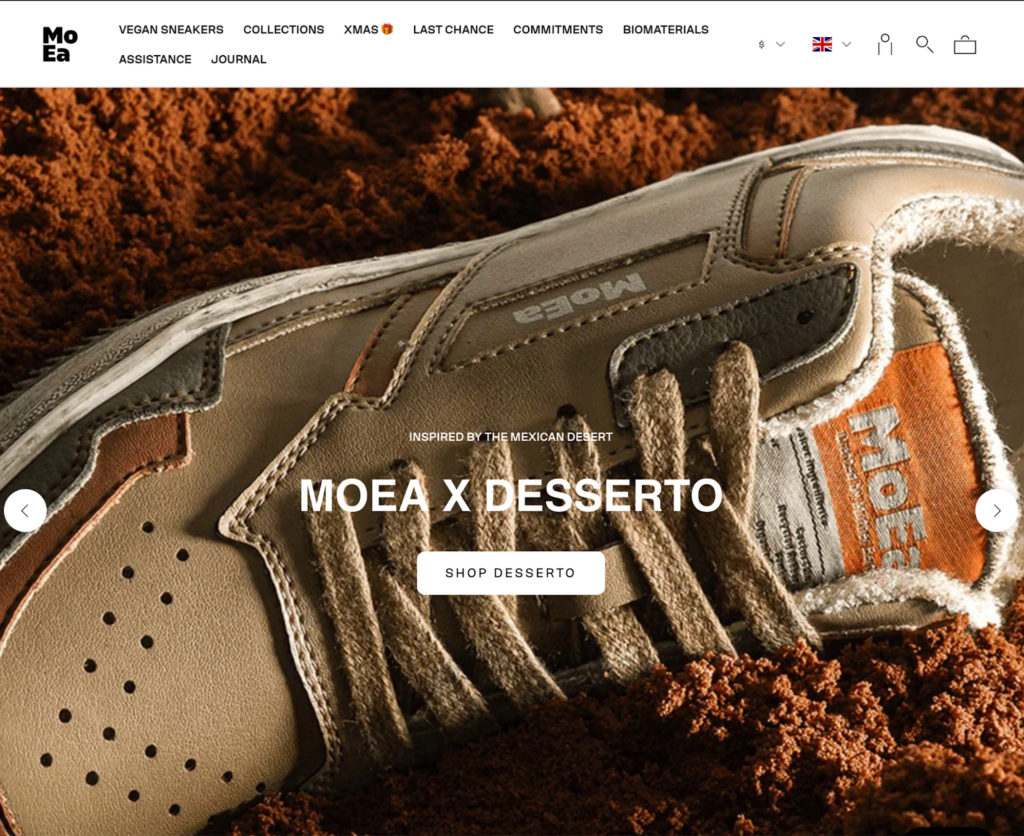
“We’ve launched MoEa to create sneakers that offer the same level of style and comfort you’d expect to see in your favourite leather pair, whilst ensuring that the planet isn’t some sort of a meaningless afterthought and that animals aren’t treated with cruelty.”
MoEa
🌎
How do they ensure their sustainability?
MoEa ensures sustainability by replacing leather with biomaterials to stay cruelty-free while reducing their carbon footprint. The biomaterials of their choice are made with agricultural waste and a stabilizer of either cotton or recycled/bio-based polyurethane. MoEa uses a range of these bio-based vegan leathers, including Piñatex, AppleSkinTM, CactusSkin, CornSkin, and GrapeSkin. Beyond shoe uppers, the brand sources recycled materials for other parts, for example, 70% recycled bamboo for the lining and 40% recycled rubber for the soles. Additionally, they calculate and disclose the life-cycle carbon footprint of each type of biomaterial used in their sneakers. Their life-cycle assessment, made by certified agency Sami, shows that a MoEa sneaker emits on average 5kg CO2 eq. In comparison, the estimated carbon impact of a pair of bovine leather shoes is over 60 kg CO2 eq.
🌐
How do they ensure their ethics?
MoEa ensures their ethics by using traceable materials and holding the last stage of production in Portugal, a low/medium risk country for labor abuse. They also visit their suppliers. Regarding animal welfare, they avoid animal cruelty practices by making their entire product range vegan, certified by PETA.
🤝
Are they part of any giving-back programs?
MoEa is a member of 1% for the Planet, donating one percent of their sales to environmental causes. They also help protect forests with WWF France.
🛍️
What is their product range?
- Best for: unisex
- Product range: sneakers, socks
- Size range: XXS–XXL
Collective Canvas: Canvas Sneakers Made With Natural, Low-Impact Materials

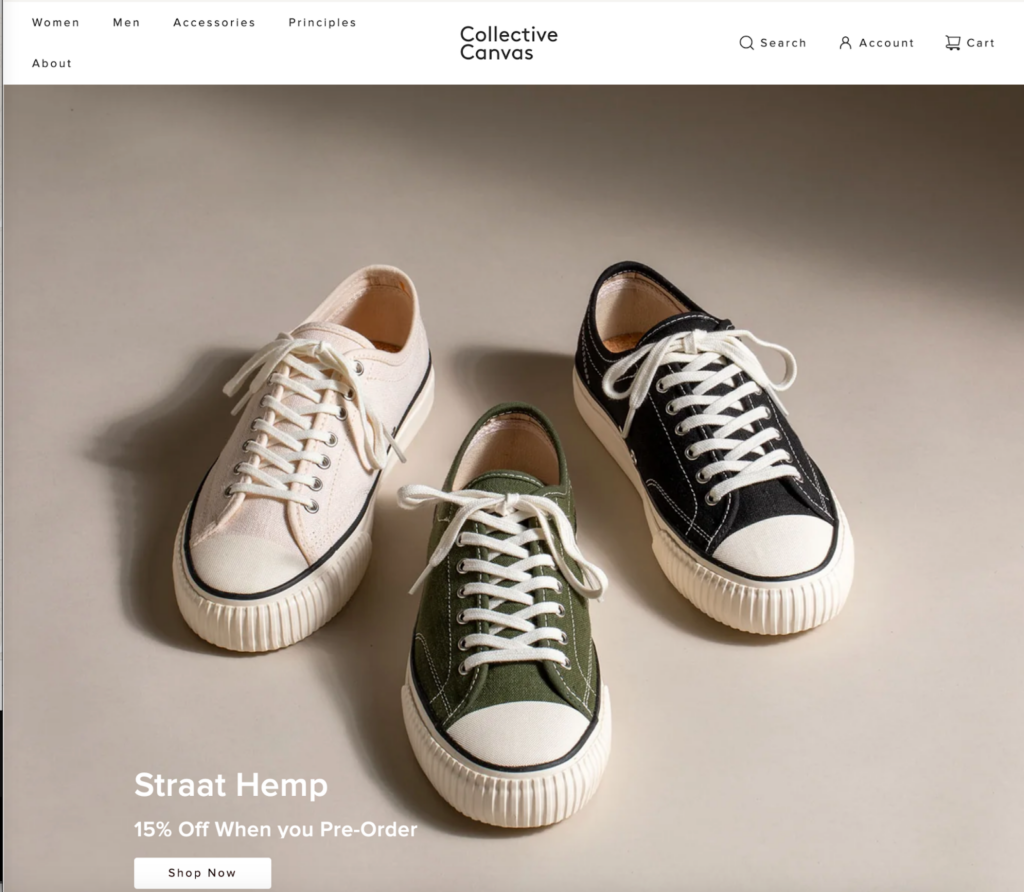
“Our intention is that through the responsible use of natural materials, the bulk of our shoes are biodegradable at the end of their life.”
Collective Canvas
🌎
How do they ensure their sustainability?
Collective Canvas ensures sustainability by sourcing natural materials for shoes and shoe boxes. 97% of the composition of their footwear products comes from nature, including organic hemp, organic cotton, natural latex rubber, and renewable castor oil. For example, their Straat Hemp Black/White sneakers have the upper made from organic hemp canvas, the lining made from a blend of hemp and organic cotton, an insole made with renewable caster oil and naturally sustainable cork veneer, and laces made with organic cotton. Regarding packaging, their shoe boxes and courier bags are made from 100% post-consumer paper waste and printed from plant-based inks. Furthermore, Collective Canvas has a Takeback & Recycling Scheme, offering customers a responsible way of recycling used sneakers. Specifically, the organic cotton canvas uppers and laces are recycled in Little Yellow Bird’s Circular Cotton initiative to create new yarns for textile production. On the other hand, the natural rubber soles and upper reinforcements are ground into rubber crumbs and then repurposed into roading asphalt, equestrian arenas, and artificial sports turf. Similarly, the insoles and eyelets are given new life rather than sent to landfills.
🌐
How do they ensure their ethics?
Collective Canvas is transparent about where their products are made. All workers are paid a living wage, which includes health insurance and pension contributions. The workers are also provided daily meals, on-site lodging, as well as the option of free English classes. They visit their manufacturer in China several times a year. Collective Canvas is also transparent about their prices, broken down by the core components of their footwear products.
🤝
Are they part of any giving-back programs?
Collective Canvas sells all of their b-stock or less-than-perfect pairs as Imperfects and gives 100% of the proceeds to the Mental Health Foundation of New Zealand.
🛍️
What is their product range?
- Best for: menswear, womenswear
- Product range: sneakers, accessories
- Price range: $$$
- Size range: XS–XL
Ethletic: Traceable Sneakers Made With Natural and Recycled Materials
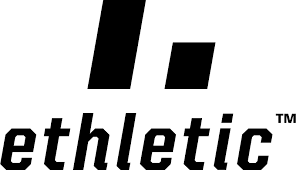
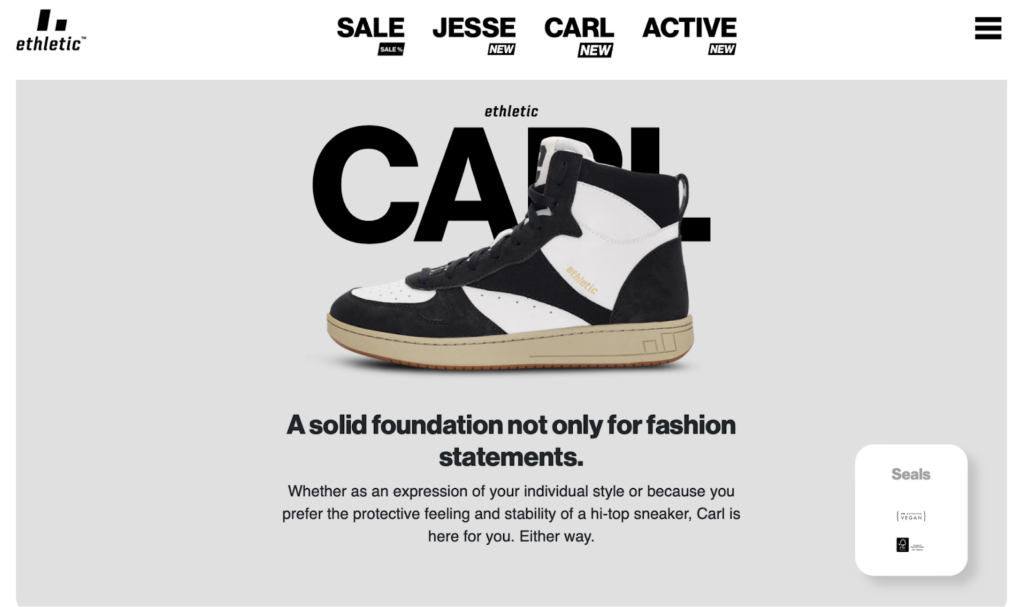
“The people who work for Ethletic aren’t numbers on a balance sheet or a cost factor for us. We know these people. We appreciate them and their skills, their commitment, their history.”
Ethletic
🌎
How do they ensure their sustainability?
Ethletic promotes sustainability by using a high proportion of eco-friendly materials. Specifically, for their signature shoes, they source canvas based on Fairtrade organic cotton for the uppers and FSC-certified rubber for the soles. Additionally, Ethletic uses GRS-certified recycled PU leather in some models to achieve high comfort and guaranteed perfect fit. Further down the life-cycle in the manufacturing stage, Ethletic shoes are built in a way that allows future separation and recycling, a first step toward going circular. Regarding transportation, Ethletic commits to “no air shipment,” transporting all their sneakers exclusively by ships. Since 2019, they have offered their customers a discounted repair option in collaboration with Berlin-based start-up Sneaker Rescue, helping to extend the lifespan of the sneakers and reduce pressure on the environment.
🌐
How do they ensure their ethics?
Ethics is at the center of Ethletic’s operation. Their manufacturing partner is Fairtrade-certified and has a premium-funded worker society, ensuring the workers’ fair working conditions and treatment. Specifically, for each pair of shoes sold, one US dollar is paid as a premium to the Talon Fair Trade Workers Welfare Society. A democratically elected group then decides which health care and educational projects to use this money for. Ethletic also traces the whole supply chain and audits most of their suppliers. They disclose the workers who make their products and enable visitors to tip these workers directly on their website. Additionally, Ethletic commits to product traceability, including the total distance traveled from fabric to brand and the material composition.
🤝
Are they part of any giving-back programs?
Ethletic is not known to be part of any giving-back programs.
🛍️
What is their product range?
- Best for: menswear, womenswear
- Product range: sneakers
- Price range: $$
- Size range: XS–XL
Womsh: Sneakers Designed and Manufactured Entirely in Italy

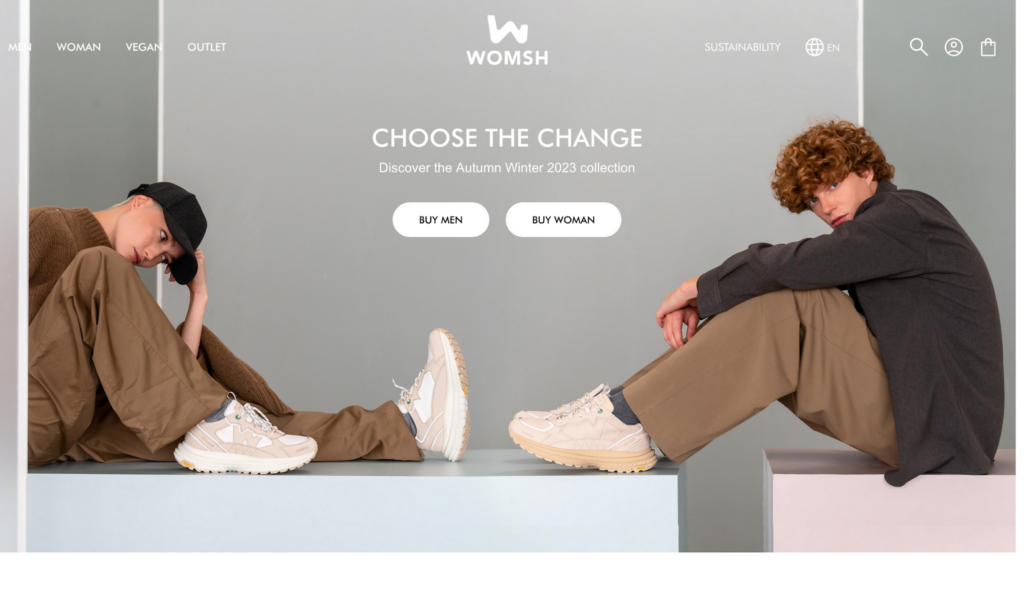
“Womsh (Word Of Mouth Shoes): starting with our name, with each word, we want to promote a more conscious and environmentally friendly purchasing philosophy. We would like to create a tribe of people who think, choose and start to change the world with their small yet effective everyday gestures.”
Womsh
🌎
How do they ensure their sustainability?
Womsh prioritizes sustainability by sourcing a medium proportion of eco-friendly textile and packaging materials, opting for low-impact production, and implementing incentives to reduce their carbon footprint. Firstly, they lower their environmental impacts by using 100% recycled cardboard for packaging and transitioning into using vegan leather AppleSkinTM (50% apple fiber and 50% Polyurethane) in the sneakers. Secondly, they opt for a metal-free tanning process for the leather used in the uppers of some shoe models and for the lining of the entire collection, guaranteeing safety for people’s health and for the environment. Lastly, their carbon footprint reduction incentives include relying on clean and renewable sources for 90% of the energy needed in the main manufacturing factory, keeping sourcing and manufacturing locally within Italy to avoid long-distance transportation and its associated carbon emission, and offsetting carbon emissions with the project Zero Impact under their partnership with LifeGate.
🌐
How do they ensure their ethics?
Womsh traces most of their supply chain and ensures payment of a living wage for some suppliers. The workers who produce their shoes are paid according to European standards and provided with a safe and healthy working environment.
🤝
Are they part of any giving-back programs?
Womsh participates in recycling projects where their sneakers are collected and taken apart so that the upper parts can be turned into granular material. Such materials are used in children’s playgrounds as anti-shock flooring.
🛍️
What is their product range?
- Best for: menswear, womenswear
- Product range: sneakers
- Price range: $$$
- Size range: XS–XL
Good Guys: Vegan and Cruelty-Free Shoes Made In Europe
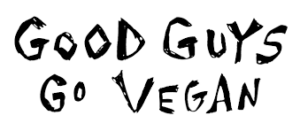
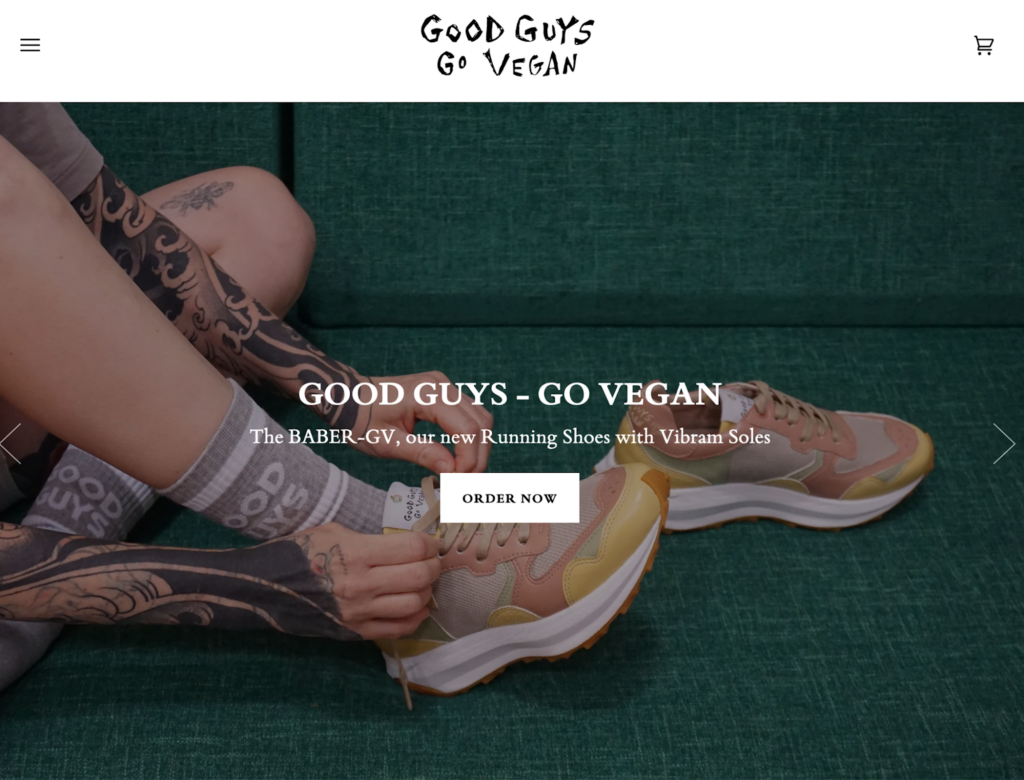
“We carefully choose our collaborators and make sure all our productions are made in a fair-trade environment and are 100% Vegan, from the glue to all the components we use for our shoes.”
Good Guys
🌎
How do they ensure their sustainability?
Good Guys prioritizes sustainability by replacing high-impact animal-derived materials with vegan alternatives. They opt for AppleSkinTM and REACH-certified PU-based microfibers instead of leather and suede for the shoe upper, avoiding the chemicals and the cruelty associated with sourcing and processing animal products. For the lining of their shoes, Good Guys uses bio-based, recycled, recyclable microfiber approved by OEKO-TEX® STANDARD 100. Additionally, they source natural materials for soles and glue elements. Additionally, they keep sourcing and manufacturing within relatively close distances (within the regions of Italy, Spain, and Portugal), lowering their transport carbon footprint. Lastly, they strive to extend the lifespan of their shoes with a care guide and an incentive to recycle pre-loved Good Guys products.
🌐
How do they ensure their ethics?
Good Guys is transparent about the final production stage of their products, sharing their Europe-based manufacturing partners and the specific footwear made in each facility. Manufacturing in the European Union, a low/medium risk region for labor abuse, makes it easier to guarantee a fair-trade environment. Good Guys also visits their suppliers. Regarding animal welfare, they avoid animal cruelty practices by making their entire product range vegan.
🤝
Are they part of any giving-back programs?
Good Guys is not known to be part of any giving-back programs.
🛍️
What is their product range?
- Best for: womenswear, menswear
- Product range: sneakers, boots, clogs, sandals, socks
- Price range: $$$
- Size range: XS–XXL
Orba: “Comfort-Without-Compromise” Shoes

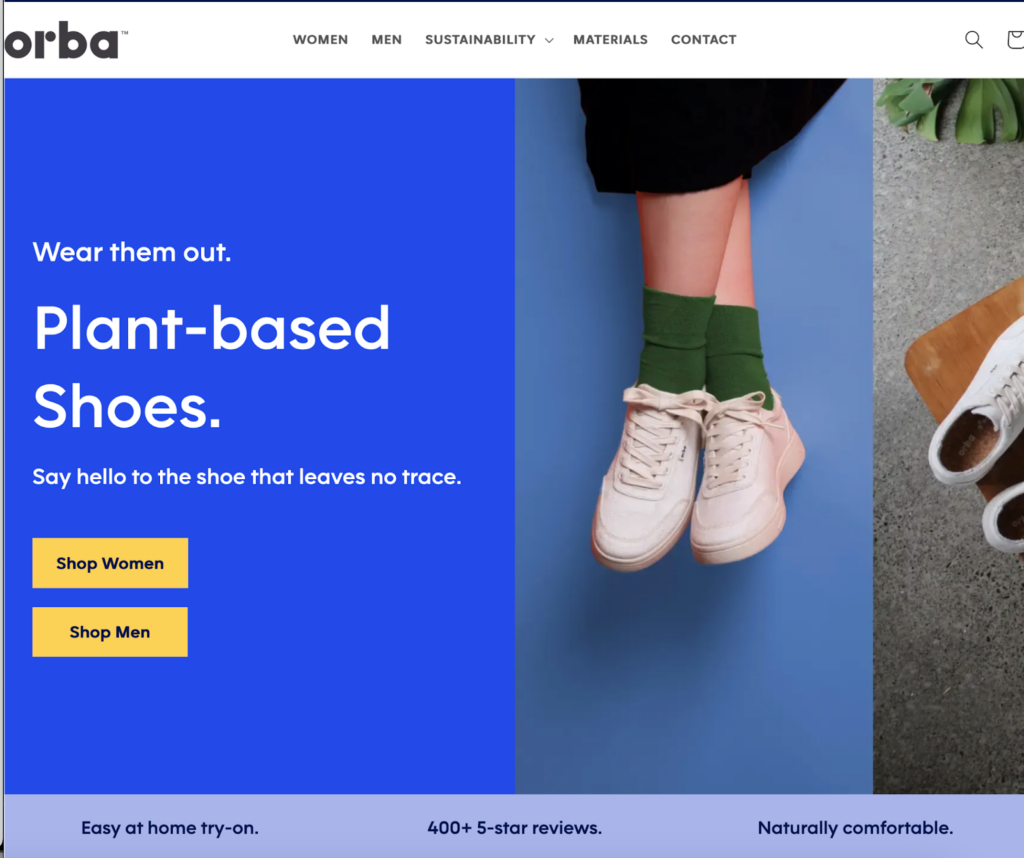
“We make shoes that are good for the people and good for the planet without compromising comfort and quality.”
Orba
🌎
How do they ensure their sustainability?
Orba ensures their sustainability by designing and making shoes that are biodegradable. They achieve this by sourcing natural materials for all compositions of their shoes. Specifically, their sneakers don’t use a high-polluting leather upper, but a canvas upper made of linen, hemp, and ramie from renewable organic, rainfed crops. Orba was the first brand in the world to combine three of the most sustainable plant fibers in their upper. Additionally, they use soles made of natural rubber, rice husk ash, coconut oil, and beeswax, and footbeds that consist of cork, coconut husk, agave sisal, and latex. The materials for laces and threads are GOTS-certified organic cotton. Lastly, Orba has their shoes and materials go through 40 different tests to ensure that there are no traces of hidden pollutants; therefore, the shoes can go safely back to the earth at the end of their life.
🌐
How do they ensure their ethics?
Orba binds their suppliers with an Orba Supplier Code of Conduct, ensuring social equity and fair treatment in their factories. Their Tier 1 supplier meets the Business Social Compliance Initiative Code of Conduct (BSCI). Additionally, they fund training programs to achieve sustainable growth and a pathway for their smaller suppliers to comply with BSCI in the future.
🤝
Are they part of any giving-back programs?
Orba is not known to be part of any giving-back programs.
🛍️
What is their product range?
- Best for: menswear, womenswear
- Product range: sneakers
- Price range: $$$
- Size range: XS–XL
ID.EIGHT: Sneakers Made With Waste

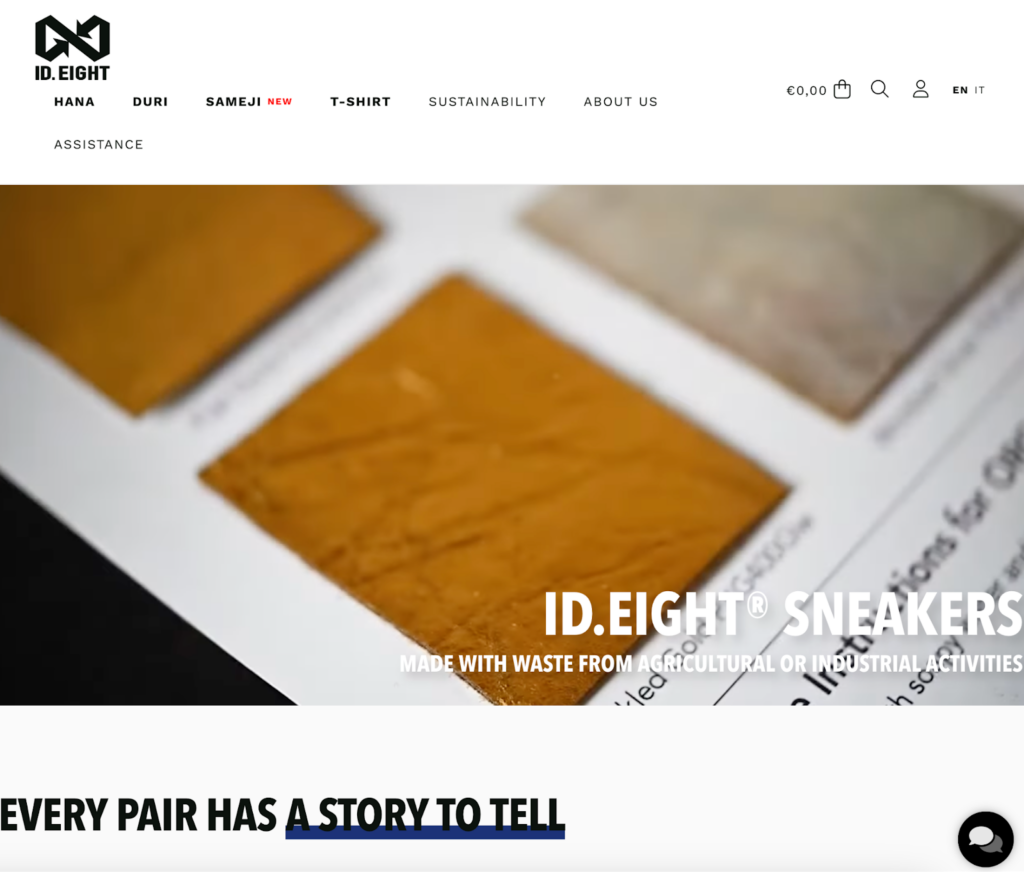
“We create low environmental impact sneakers with innovative and eco-sustainable materials, unisex, with a refined design that recalls the 90s.”
ID.EIGHT
🌎
How do they ensure their sustainability?
ID.EIGHT ensures sustainability firstly by sourcing low-impact materials. Specifically, more than 70% of components are made from recycled materials, including AppleSkinTM from apple waste, Piñatex from pineapple leaf waste, and VEGEA based on leftovers from the grape juice industry. Further down the life-cycle in the manufacturing stage, they work with manufacturing partners using renewable energy to lower their carbon footprint. Other carbon reduction incentives are to partner with a courier that uses bicycles and electric vehicles and to schedule all shipments on just 2 days a week. Additionally, they offset the rest of their transporting emissions to achieve carbon neutrality. During the transportation stage, ID.EIGHT designs one-single-piece shoe boxes made of 100% recyclable FSC-certified cardboard. The cardboard itself contains 80% recycled paper. ID. EIGHT’s sustainability efforts also cover the end-of-life of their products. They partner with two Italian companies, Must Had and Eso Recycling, to give a second life to textile waste. Customers can send in their broken or worn ID.EIGHT sneakers to have the parts recycled or repurposed.
🌐
How do they ensure their ethics?
ID.EIGHT traces most of their supply chain and holds the final stage of production in the European Union.
🤝
Are they part of any giving-back programs?
ID.EIGHT is not known to be part of any giving-back programs.
🛍️
What is their product range?
- Best for: womenswear, menswear
- Product range: sneakers
- Price range: $$$
- Size range: S–XL
Flamingos’ Life: Vegan Sneakers Handmade With Natural and Recycled Materials


“We use our company to provide a solution to the ecological crisis in which we find ourselves. Veganism is a vehicle for change, it is the key to reducing greenhouse gas emissions and our water footprint. ”
Flamingos’ Life
🌎
How do they ensure their sustainability?
Flamingos’ Life ensures sustainability by sourcing low-impact textiles for their sneakers and recycled materials for their packaging. Specifically, they have developed their own sneaker materials from plant materials, such as corn waste, virgin bamboo and cotton grown without pesticide, and natural rubber extracted sustainably. Using biodegradable materials (corn and bamboo) in their sneakers helps reduce carbon emissions and toxicity. Additionally, Flamingos’ Life opts for recycled polyester made with post-consumer plastic to help reduce plastic waste, especially in marine environments. Flamingos’ Life also uses recycled packaging.
🌐
How do they ensure their ethics?
Flamingos’ Life ensures their ethics by striving for full transparency and making the entire supply chain more democratic. They partnered with the sustainable fashion consulting company BCOME to conduct a deep analysis of their production processes (raw materials, working conditions, corporate traceability, product cycle, and waste, among other aspects) and their environmental footprint. The study confirmed that around 100 people contribute to creating one of their sneaker designs and all work in safe and ethical working conditions. Flamingos’ Life traces most of their supply chain and holds the final stage of production in Spain, a medium-risk country for labor abuse.
🤝
Are they part of any giving-back programs?
Flamingos’ Life gives back by associating each of their sneaker collections with a social project, aiming to balance their impact and improve the lives of the most vulnerable. For example, every sale in the Classic 70s collection helps plant 5 trees. Flamingos’ Life works with Agua ONG to build water wells in underserved areas of Uganda, Eden Reforestation Projects to plant trees in Madagascar and Mozambique, and make monthly monetary donations to Waste Free Oceans for marine litter collection.
🛍️
What is their product range?
- Best for: womenswear, menswear
- Product range: sneakers
- Price range: $$
- Size range: XS–XL
NAE Vegan Shoes: Shoes Made Sustainably With “No Animal Exploitation” (NAE)
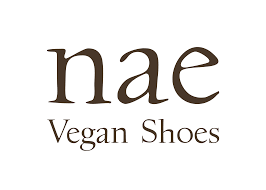
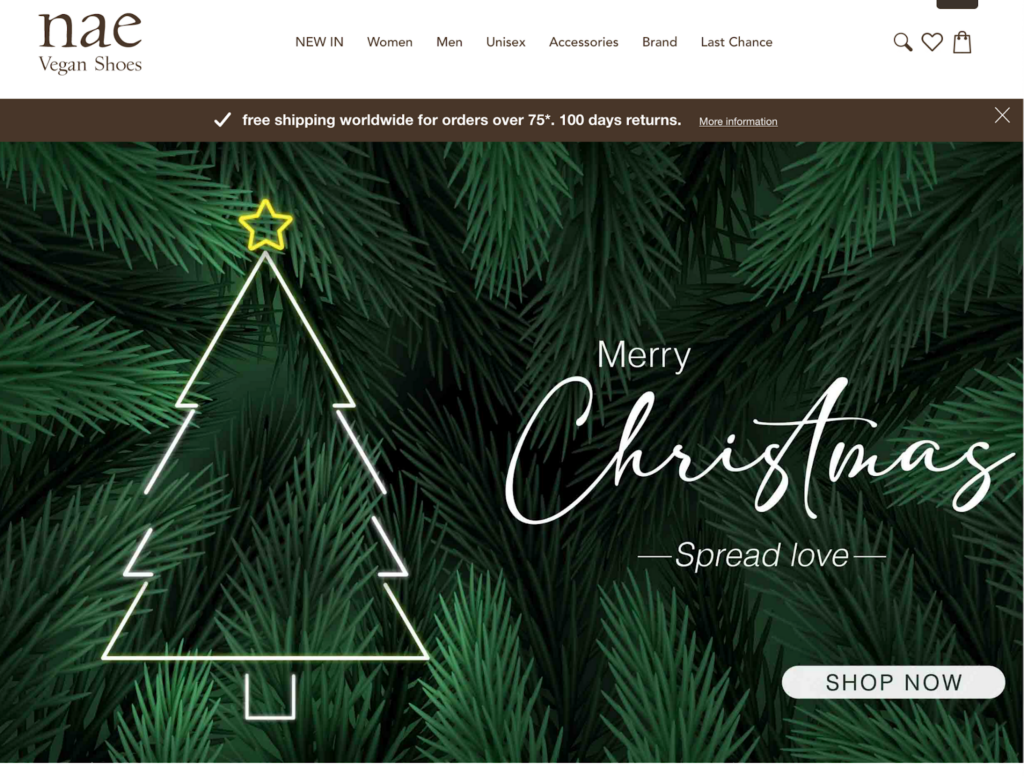
“We carefully select the best material options that meet our environmental ideals, without compromising the quality and durability of our vegan shoes.”
NAE Vegan Shoes
🌎
How do they ensure their sustainability?
NAE Vegan Shoes ensures sustainability by sourcing durable materials according to environmental parameters such as resources and waste, energy usage and carbon emissions, chemical use, and pollution. Consequently, they don’t use animal leather, but rather Piñatex and AppleSkinTM vegan leather alternatives, for their shoes. NAE Vegan Shoes also sources low-impact materials like organic cotton, cork, and recycled polyester for their footwear products. Additionally, every element of their packaging is 100% recyclable. NAE Vegan Shoes also uses recycled cardboard boxes, recycled kraft wrapping paper, and eco-friendly tape made from kraft paper and natural rubber adhesive.
🌐
How do they ensure their ethics?
NAE Vegan Shoes traces most of their supply chain. Their final production stage is undertaken in Spain and Portugal, medium-risk countries for labor abuse. Regarding animal welfare, they avoid animal cruelty practices by making their entire product range vegan.
🤝
Are they part of any giving-back programs?
NAE Vegan Shoes is not known to be part of any giving-back programs.
🛍️
What is their product range?
- Best for: menswear, womenswear
- Product range: boots, sneakers, flat shoes, heels, sandals, accessories
- Price range: $$$
- Size range: XS–XXL
Why Is It Important to Buy Products Made of More Sustainable Fabrics
It is important to buy products made of more sustainable fabrics because a sustainable textile industry has a lower carbon footprint, helps save natural resources, and is better for forests, animals, and humans.
Buying Sustainable Fabrics Reduces Your Carbon Footprint
The production of clothing and footwear is estimated to contribute 10% of global greenhouse gas emissions—more than all international flights and shipping combined. If the fashion industry were a country, it would be the fourth largest emitter of carbon dioxide.
One way to reduce the carbon footprint of the clothes you buy is to opt for sustainable fabrics. Sustainable fabrics, which are often made with natural or recycled fibers, have relatively low carbon footprints compared to petroleum-based fabrics. For example, organic cotton made in the US has a carbon footprint of 2.35 kg CO2 (per ton of spun fiber)—a quarter of polyester’s carbon footprint.
Buying Sustainable Fabrics Reduces Demand For Natural Resources and Waste Management
The textile industry uses water and land to grow cotton and other fibers. It is estimated that 79 billion cubic meters of water were used for the sector worldwide in 2015. For example, producing a single cotton t-shirt requires as much water as one person drinks for 2.5 years (2,700 liters of fresh water).
Worse yet, the textile economy is vastly more linear than circular: the largest amount of resources used in clothes ended up in landfills (instead of being recycled to remake clothes). According to a report by the Ellen MacArthur Foundation,
- Less than 3% of materials used in the textile economy in 2015 came from recycled sources.
- In other words, more than 97% of resources used in making clothes are newly extracted.
When clothing items are disposed of within a short period of time—under a year in the case of half of the fast fashion clothes—the natural systems that provide raw materials for fabrics don’t have enough time to recover and regenerate, which could lead to ecological breakdown.
Sustainable fabrics are made with less water and emissions while lasting longer:
- Because they are durable, you don’t need to buy new clothes too often.
- Thus, you help reduce the pressure to extract more resources for making new items.
Similarly, making and consuming sustainable fabrics made with recycled materials reduces the demand for virgin materials while helping tackle waste management.
Buying Sustainable Fabrics Encourages Sustainable Management of Forests
Sustainable natural fiber fabrics are made with raw materials from forests and plantations that are sustainably managed, such as complying with FSC standards.
When you buy sustainable natural fiber fabrics, you discourage unsustainable forestry practices like illegal logging. You can help reduce deforestation, biodiversity loss, and the effects of climate change.
Buying Sustainable Fabrics Encourages Fairer Treatment of Animals
The fashion industry is rife with animal mistreatment when it comes to making animal-based fabrics like wool or silk. Every year, billions of animals suffer and die for clothing and accessories.
Buying sustainable vegan alternatives can help to reduce the pressure on raising more and more animals to meet the demand for animal-based fabrics while sacrificing their well-being and lives.
Suppose you have to buy fabrics made with, for example, wool or silk; make sure you only choose brands committed to cruelty-free products. In that case, you help advocate better treatments for animals raised within the textile industry.
Using Sustainable Fabrics Encourages Fairer Treatment of Textile Workers
Recent statistics from UNICEF estimated as many as 170 million child laborers worldwide, many of whom were engaged in some form of work in the textile industry. They don’t get paid minimum wages and often work long hours.
When you buy sustainable fabrics from brands transparent about the working conditions at their factories, you discourage the use of child labor and help promote better working conditions for textile workers.
How Can You Generally Buy More Sustainable Fabrics
The key to sustainably buying fabrics is to check on relevant environmental and original certifications.
For natural fabrics:
- Global Organic Textile Standard (GOTS): A globally recognized certification system that ensures a certain threshold of organic content has been met. It covers manufacturing, packaging, labeling, transportation, and distribution (but not what happens in the fields where crops are grown).
- USDA Certified Biobased Product: The USDA BioPreferred® Certification is a voluntary certification offered by the United States Department of Agriculture. The certification identifies products made from plants or other renewable materials.
- Ecolabel: Ecolabel is the official European Union voluntary label recognized worldwide for certified products with a guaranteed, independently verified low environmental impact. The label requires high environmental standards throughout the entire life-cycle: from raw material extraction through production and distribution to disposal. It also encourages companies to develop innovative, durable, easy-to-repair, and recyclable products.
For natural fiber semi-natural/semi-synthetic fabrics:
- Forest Stewardship Council: An FSC certification ensures that the wood (or wood-like material) comes from responsibly managed forests that provide environmental, social, and economic benefits.
There are two types of FSC Certification:- FSC Forest Management Certification, with a focus on the origin of the wood—the forest.
- FSC Chain of Custody Certification, which focuses on the path from the forest to the customer’s home.
- Program for Endorsement of Forest Certification: PEFC’s approaches to sustainable forest management are in line with protecting the forests globally and locally and making the certificate work for everyone. Getting a PEFC certification is strict enough to ensure the sustainable management of a forest is socially just, ecologically sound, and economically viable but attainable not only by big but small forest owners.
For recycled fabrics:
- Recycled Claim Standard (RCS): The Textile Exchange RCS was originally developed as an international, voluntary standard that sets requirements for third-party certification of Recycled input and chain of custody.
- The Global Recycled Standard (GRS): The Global Recycled Standard (GRS) is an international, voluntary, full product standard that sets requirements for third-party certification of Recycled Content, chain of custody, social and environmental practices, and chemical restrictions. It can be used for any product with more than 20% recycled material.
For all types of fabrics:
- STeP by OEKO-TEX®: STeP by OEKO-TEX® is an independent certification system for brands, retailers, and manufacturers from the textile and leather industry. It communicates organizational environmental measures, including reducing carbon footprint and water usage.
- OEKO-TEX® Standard 100: OEKO-TEX® labels aim to ensure that products pose no risk to human health (i.e., containing banned chemicals).
Some certifications that are signaling brands’ efforts toward lowered environmental impacts and a circular economy are:
- B Corp Certification: The label B Corp is a certification reserved for for-profit companies. Certified holders are assessed on their social and environmental impacts.
- Cradle2Cradle certification: Cradle2Cradle provides a standardized approach to material circularity. It assesses whether products have been suitably designed and made with the circular economy in mind covering five critical categories: material health, material reuse, renewable energy and carbon management, water stewardship, and social fairness.
Final Thoughts
Sneakers are one of those trendy fashion symbols that can have severe adverse environmental impacts because of the challenges in recycling them and their conventional use of high-impact materials. Thus, it is important to shop with ethics and sustainability in mind when choosing your next pair.
By purchasing new or pre-loved sneakers from brands that commit to sustainability, you support their mission to create a fairer and less harmful textile industry for all lives on Earth.
Here is the list (again) of the most sustainable sneaker brands:
- Nothing New
- CARIUMA
- VEJA
- Allbirds
- PSUDO
- Wildling Shoes
- MoEa
- Collective Canvas
- Ethletic
- Womsh
- Good Guys
- Orba
- ID.EIGHT
- Flamingos’ Life
- NAE Vegan Shoes
To make your use of these clothing items even more sustainable, follow these steps:
- Buy second-hand, recycled, or upcycled sneakers made with low-impact materials.
- While using sneakers, maximize the number of wears between washes and keep them as long as possible.
- At the end-of-life of your sneakers, upcycle the materials to extend their usage and arrange for them to be recycled or properly disposed of.
Stay impactful,

Sources
- Science Direct: Life-cycle assessment (LCA)
- Nothing New: Home
- CARUMIA: Home
- VEJA: Home
- Allbirds: Home
- PSUDO: Home
- Wildling Shoes: Home
- MoEa: Home
- Collective Canvas: Home
- Ethletic: Home
- Womsh: Home
- Good Guys: Home
- Orba: Home
- ID.EIGHT: Home
- Flamingos’ Life: Home
- NAE Vegan Shoes: Home
- Nothing New: Our Materials
- Impactful Ninja: How Sustainable Are Canvas Fabrics? A Life-Cycle Analysis
- Textile Exchange: Global Recycle Standard
- Impactful Ninja: How Sustainable Are Leather Fabrics? A Life-Cycle Analysis
- Leather Working Group: Home
- Nothing New: Carbon Neutral Commitment
- Good On You: Brand Directory | Nothing New
- Nothing New: Virtuous Circle Program
- B Corporation: CARIUMA
- CARIUMA: EMPOWERING SUSTAINABLE CHOICES | Materials
- Impactful Ninja: How Sustainable Are Organic Cotton Fabrics? A Life-Cycle Analysis
- Impactful Ninja: How Sustainable Are Cotton Fabrics? A Life-Cycle Analysis
- Impactful Ninja: How Sustainable Are Recycled Nylon Fabrics? A Life-Cycle Analysis
- CARIUMA: What is Ethically Sourced Leather?
- CARIUMA: EMPOWERING SUSTAINABLE CHOICES | Operations
- CARIUMA: EMPOWERING SUSTAINABLE CHOICES | Factories
- CARIUMA: Code of Conduct
- Good On You: Brand Directory | CARIUMA
- CARIUMA: Leather sneakers
- CARIUMA: Animal Welfare Policy
- Leather Working Group: Home
- CARIUMA: REFORESTATION PROGRAM
- Impactful Ninja: How Sustainable Are Recycled Polyester Fabrics? A Life-Cycle Analysis
- VEJA: Transparency
- Impactful Ninja: How Sustainable Are Jute Fabrics? A Life-Cycle Analysis
- Impactful Ninja: How Sustainable Are Recycled Cotton Fabrics? A Life-Cycle Analysis
- VEJA: Leather
- VEJA: The blindness around CO2 emissions
- VEJA: Limits
- VEJA: Fair trade
- VEJA: Production
- Good On You: Brand Directory | VEJA
- VEJA: Reintegration
- Allbirds: Sustainability Guide & Practices
- Allbirds: What’s in a Footprint | Sustainability Practices
- Allbirds: Carbon OffsetsSustainability Practices
- Allbirds: Renewable Materials | Sustainability Practices
- Allbirds: Regenerative agriculture | Sustainability Practices
- Allbirds: Responsible energy | Sustainability Practices
- Impactful Ninja: How Sustainable Are Recycled Fabrics? A Life-Cycle Analysis
- Impactful Ninja: How Sustainable Are Synthetic Fabrics? A Life-Cycle Analysis
- Allbirds: Our Materials | SUGAR
- Allbirds: Our Story
- Impactful Ninja: How Sustainable Are Merino Wool Fabrics? A Life-Cycle Analysis
- Allbirds: What is your commitment to sustainability?
- Allbirds: M0.0NSHOT
- Allbirds: Allbirds ReRun™
- Allbirds: Supplier Code of Conduct
- ILO: Labor Standards
- Allbirds: How We Operate
- Allbirds: Tier 1 Suppliers
- Allbirds: Animal Welfare Policy
- Discovery ZQ: Home
- Soles4Souls: Home
- Sustainably Kind Living: The 25 Most Ethical & Sustainable Sneakers | Reviewed & Tested!
- PSUDO: About Us
- REPREVE: Home
- PSUDO: PSUDO blu
- Point Foundation: Home
- B Corporation: Wildling Shoes
- Wildling Shoes: Our Approach
- Wildling Shoes: Nordwolle
- Impactful Ninja: How Sustainable Are Sheep Wool Fabrics? A Life-Cycle Analysis
- Wildling Shoes: Hemp
- Wildling Shoes: A Little Perfection
- Wildling Shoes: Cotton: A fabric to quarrel about
- Rewilding Portugal: Home
- Good On You: Brand Directory | Wildling Shoes
- Wildling Shoes: Perto
- Wildling Shoes: Working for a wilder world
- Wildling Shoes: Wildling x Chiengora®️by YarnSustain
- MoEa: Material Choice
- MoEa: LCA & Carbon Footprint
- Impactful Ninja: How Sustainable Are Polyurethane (PU) Fabrics? A Life-Cycle Analysis
- Impactful Ninja: How Sustainable Are Piñatex Fabrics? A Life-Cycle Analysis
- MoEa: Apple Sneakers
- MoEa: Cactus Sneakers
- MoEa: Corn Sneakers
- Vegconomist: Meet MoEa, The Company Making Sneakers From Five Types of Sustainable Vegan Leather
- MoEa: Manufacturing Standards
- MoEa: PERA certified
- PETA: Home
- MoEa: Restoring forests with WWF France
- Collective Canvas: Principles
- Collective Canvas: End of Life Recycling
- B Corporation: In full flight – Little Yellow Bird is changing the game from farm to factory
- Collective Canvas: Imperfects
- Fair & Good: Brands We Love | Collective Canvas
- Mental Health Foundation: Home
- Good On You: Brand Directory | Ethletic
- Fairtrade: Home
- Forest Stewardship Council: Home
- Ethletic: SUSTAINABILITY
- Ethletic: Ethletic Story
- Sneaker Rescue: Home
- Fairtrade: Fairtrade Premium preview
- Ethletic: Fair For All
- Tracycle: Ethletic
- Good On You: Brand Directory | Womsh
- Womsh: OUR MATERIALS
- Impactful Ninja: How Sustainable Are AppleSkinTM Fabrics? A Life-Cycle Analysis
- Impactful Ninja: How Sustainable Are Leather Fabrics? A Life-Cycle Analysis
- Womsh: OUR ACTIONS
- Zero Impact: Home
- European Commission: REACH Regulation
- Good Guys: Our Materials
- Good On You: Brand Directory | Good Guys
- Good Guys: Cleaning your GG
- Good Guys: Good Guys x Redonner
- Good Guys: Where are my Good Guys produced?
- Good Guys: About Good Guys DON’T WEAR LEATHER
- B Corporation: Orba Shoes
- Orba: Orba Sustainability Framework 2022
- Orba: The A-Z of ways we go beyond.
- Orba: Materials
- Global Organic Textile Standard: Home
- Orba: Orba Supplier Code of Conduct
- AMFORI: Is BSCI a certificate, a label or a standard?
- Orba: Sustainability
- ID.EIGHT: Sustainability
- VEGEA: Home
- Climate Partner: ID.EIGHT
- ID.EIGHT: Recovery of Worn ID EIGHT
- Good On You: Brand Directory | ID.EIGHT
- Flamingos’ Life: Spanish plant-based shoemakers
- Good On You: Brand Directory | Flamingos’ Life
- Flamingos’ Life: MATERIALS
- Flamingos’ Life: TRANSPARENCY
- Flamingos’ Life: Classic 70s
- Flamingos’ Life: RESTORATION PROJECT
- Flamingos’ Life: WATER SUPPLY PROJECT
- Flamingos’ Life: OCEANS PROJECT
- NAE Vegan Shoes: Our Values
- NAE Vegan Shoes: NAE Materials
- Good On You: Brand Directory | NAE Vegan Shoes
- European Parliament: The impact of textile production and waste on the environment (infographic)
- Science Direct: The challenge of “Depeche Mode” in the fashion industry – Does the industry have the capacity to become sustainable through circular economic principles, a scoping review
- Science Direct: Carbon Footprint of Textile and Clothing Products
- European Parliament: Environmental impact of the textile and clothing industry
- European Parliament: What if fashion were good for the planet?
- Ellen MacArthur Foundation: A New Textiles Economy: Redesigning fashion’s future
- McKinsey: Style that’s sustainable: A new fast-fashion formula
- Forest Stewardship Council: Home
- Our World in Data: Deforestation and Forest Loss
- Our World in Data: Renewable Energy
- Peta: Animals Used For Clothing
- The Guardian: Child labour in the fashion supply chain
- BioPreferred: WHAT IS THE BIOPREFERRED PROGRAM?
- European Commission: Environment | EU Ecolabel
- Forest Stewardship Council
- FSC Forest Management Certification
- FSC Chain of Custody Certification
- Textile Exchange: The RCS and GRS are designed to boost the use of recycled materials
- Program for Endorsement of Forest Certification
- Impactful Ninja: How Sustainable Are Semi-Natural/Semi-Synthetic Fabrics? A Life-Cycle Analysis
- OEKO-TEX: Certification according to STeP by OEKO-TEX®
- B Corp Certification: Home
- C2CCertified: Home

